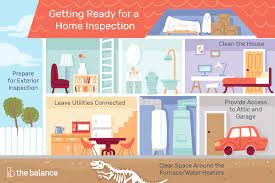Homeownership is a significant milestone, and ensuring your investment is a sound one requires a thorough home inspection. In this guide, we’ll explore the essential tips for a successful home inspection, covering everything from choosing the right inspector to understanding the inspection report.
Introduction
Importance of Home Inspections
Buying a home is more than a financial transaction; it’s a commitment to your future. A comprehensive home inspection is crucial to uncover potential issues and make informed decisions.
Role in Property Transactions
Home inspections play a pivotal role in real estate transactions, providing buyers with a detailed assessment of the property’s condition. Sellers, too, benefit from addressing concerns upfront, streamlining the selling process.
Choosing a Qualified Inspector
Credentials and Certification
When selecting a home inspector, prioritize professionals with the right credentials and certifications. Look for affiliations with reputable organizations in the industry.
Experience and Reputation
An experienced inspector brings invaluable insights. Consider reviews and testimonials to gauge the inspector’s reputation and reliability.
Preparing for the Inspection
Clean and Organize
Ensure easy access to all areas by decluttering and organizing your home. This facilitates a smooth inspection process.
Gather Relevant Documents
Provide necessary documents related to renovations, repairs, and maintenance. This aids the inspector in understanding the property’s history.
Areas Covered in a Home Inspection
Structural Components
Inspectors evaluate the foundation, walls, and overall structural integrity to identify any potential issues.
Electrical Systems
A thorough examination of wiring, outlets, and circuit panels is essential to prevent electrical hazards.
Plumbing
From leaky faucets to sewer line inspections, plumbing assessments cover a spectrum of potential concerns.
HVAC Systems
Heating, ventilation, and air conditioning systems are scrutinized for efficiency and potential maintenance needs.
Roof and Attic
Identifying roofing issues and assessing attic insulation contribute to a comprehensive inspection.
Appliances
Functional testing of appliances ensures they are in good working order, saving you from post-purchase surprises.
Common Issues Found During Inspections
Water Damage
Identifying water damage early can prevent structural issues and mold growth.
Electrical Problems
Addressing electrical issues promptly is crucial for the safety of your home.
Roofing Issues
From missing shingles to leaks, roofing problems are common and should be addressed promptly.
Plumbing Concerns
Leaky pipes and faulty plumbing can lead to significant damage if not addressed promptly.
Understanding the Inspection Report
Clear Explanation of Findings
A good inspector provides a clear and detailed report, explaining findings in a way that is easily understood.
Importance of Photos and Documentation
Visual documentation enhances your understanding of the issues found during the inspection.
Negotiating Repairs After an Inspection
Prioritizing Issues
Not all issues are of equal importance. Prioritize necessary repairs and address them in negotiations.
Seeking Professional Estimates
Obtain estimates from qualified professionals to negotiate repairs more effectively.
DIY Home Inspection Tips
Regular Maintenance Checks
Performing regular checks on your property allows you to identify and address minor issues before they escalate.
Identifying Minor Repairs
Learning to identify and fix minor repairs yourself can save both time and money.
Environmental Considerations
Radon and Mold Inspections
Environmental hazards like radon and mold can be identified through specialized inspections.
Pest Inspections
Protect your investment by ensuring your home is free from pest infestations through thorough inspections.
Home Inspection for Sellers
Preparing the Property
Sellers can enhance the appeal of their property by addressing potential concerns before listing.
Addressing Potential Concerns
Proactively addressing issues can expedite the selling process and instill confidence in potential buyers.
Benefits of a Thorough Home Inspection
Cost Savings in the Long Run
Identifying and addressing issues early can save you from costly repairs down the line.
Peace of Mind for Buyers
Buyers gain confidence and peace of mind, knowing the true condition of the property they are considering.
Importance of Attending the Inspection
Direct Interaction with the Inspector
Attending the inspection allows you to interact directly with the inspector, seeking clarifications in real-time.
Real-Time Clarifications
Being present during the inspection enables you to get instant explanations and insights.
Common Misconceptions About Home Inspections
All Inspectors Are the Same
Not all inspectors have the same level of expertise. Research and choose wisely.
New Homes Don’t Need Inspections
Even new constructions can have issues. A thorough inspection is essential regardless of a home’s age.
Future Considerations Post-Inspection
Maintenance Schedules
Establishing a regular maintenance schedule based on the inspection findings ensures the longevity of your home.
Periodic Re-inspections
Periodic re-inspections can catch issues early, preventing potential long-term damage.
Conclusion
A successful home inspection is a collaborative effort between buyers, sellers, and inspectors. Taking the time to choose a qualified professional, preparing your home, and understanding the inspection process can make a significant difference in your homeownership journey.
Frequently Asked Questions (FAQs)
- What is the primary purpose of a home inspection?
A home inspection aims to assess the overall condition of a property, identifying any existing or potential issues that may impact its value or safety.
- How long does a typical home inspection take?
The duration of a home inspection varies but usually takes between two to three hours. Larger or more complex properties may require more time.
- Can I perform a home inspection on my own?
While regular maintenance checks are encouraged, a professional home inspection is best left to qualified inspectors with the necessary expertise and equipment.
- What happens if the inspection reveals significant issues?
If major issues are identified, buyers can negotiate repairs with the seller or, in some cases, opt to withdraw from the purchase agreement.
- Is a home inspection necessary for new constructions?
Yes, even new homes can have construction flaws or issues. A thorough inspection ensures that everything is in order before finalizing the purchase.

